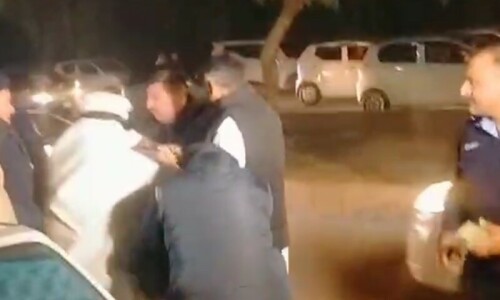IT is an unprecedented and, curiously, a constitutionally unforeseen event: a serving prime minister, the chief executive of the federation, undergoing surgery that will possibly keep him out of the country for several weeks. In terms of a government that is effectively frozen, the event is not new. During multiple political crises over the last two parliaments, the federal government has for long stretches been forced to or opted to put regular governance matters on the back-burner. But it is entirely new for a prime minister to be absent from the country for such a long period and for the federal government to go through the formal budget process without the chief executive. While the government has announced that Prime Minister Nawaz Sharif will convene the federal cabinet via videoconference a day before he undergoes surgery, it has not clarified what the rules of business state on the matter. There may not be an immediate constitutional crisis, but the situation that has arisen demands at least two things be done.
First, the government should institute the practice of the chief executive undergoing an annual medical examination and the results being shared with the public. The US, for example, has a periodic medical examination of the president, the results of which are released by the White House and that contain specific information on the state of his pulmonary, cardiology, neurological and musculoskeletal systems, among others. The health of the chief executive is a matter of legitimate public interest and democratic concern. Mandating a periodic physical examination of the prime minister will boost transparency and confidence in the system. Second, the government needs to look into whether the Constitution itself or the rules of business need to be changed to introduce a formal temporary transfer of the chief executive’s authority. It is one thing for Mr Sharif to repose great trust and confidence in Finance Minister Ishaq Dar, but quite another to simply hand over the reins of the federation to a federal minister, who is technically equal in rank and authority to other full federal ministers. The constitutional system of governance works by having the public elect its representatives and the elected representatives choosing a chief executive. The government does not belong to Mr Sharif or any other prime minister and it cannot be treated like a private business where ad hoc arrangements are made. A constitutional lacuna has been identified — the government must now address it.
Published in Dawn, May 29th, 2016










































